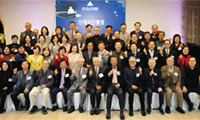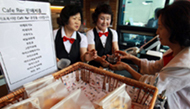The Origin and of the Phrase“Yellow Peril”and How it Applies Today

Nichole Kim / Cleveland HS 12th Grade
As Asians began immigrating to the United States in the late nineteenth and twentieth centuries, the term “yellow peril” was developed to label them as a threat and danger to the Western world. More specifically, it started when Chinese immigrants were brought to the U.S. to provide cheap manual labor. “Yellow peril” became a xenophobic racial slur, used by White workers who felt that the Chinese workers were a menace to their livelihood, to dehumanize Asian immigrants. This ultimately led to the passage of the Chinese Exclusion Act in 1882, restricting access into the country on the basis of race.
However, in the 1960s, Asian Americans made the attempt to reclaim the phrase and change the implications surrounding it into those of empowerment. Many college students of color at San Francisco State University created the Third World Liberation Front, a coalition with the Black Student Union. They advocated for a shift in admissions processes and curriculum, as well as protested the Vietnam War.
The phrase “Yellow Peril Supports Black Power” is widely known from a photograph taken in 1969 of Japanese American Richard Aoki holding a sign with the phrase at a rally. Aoki was known as a prominent civil rights activist and early member and Field Marshal of the Black Panther Party.
Recently, this phrase has started circulating again on social media platforms and on picket signs and posters at protests. Many Asians are using it to show that they stand in solidarity with the Black community. While this phrase was a way for Asian Americans to voice their support for the Black community and fight against the oppressive system, many feel that it is not the same now, compared to back then.
This is because there are many Asians who do not identify as “yellow”, meaning it is not an inclusive term. Many people also felt that this phrase did not emphasize what has historically been made possible for Asian Americans through Black struggles.
supportive of the Black Lives Matter Movement, the impact has proven differently. For Asian Americans who are seeking ways to ally with black communities, Wun, of AAPI Women Lead, “challenges individuals to think about whether their actions work to combat police brutality against black people, or if they’re centered around their own feelings.”
Nichole Kim / Cleveland HS 12th Grade
<Nichole Kim / Cleveland HS 12th Grade>
스마터리빙
more [ 건강]
[ 건강]이제 혈관 건강도 챙기자!
[현대해운]우리 눈에 보이지 않기 때문에 혈관 건강을 챙기는 것은 결코 쉽지 않은데요. 여러분은 혈관 건강을 유지하기 위해 어떤 노력을 하시나요?
 [ 건강]
[ 건강]내 몸이 건강해지는 과일궁합
 [ 라이프]
[ 라이프]벌레야 물럿거라! 천연 해충제 만들기
 [ 건강]
[ 건강]혈압 낮추는데 좋은 식품
[현대해운]혈관 건강은 주로 노화가 진행되면서 지켜야 할 문제라고 인식되어 왔습니다. 최근 생활 패턴과 식생활의 변화로 혈관의 노화 진행이 빨라지고
사람·사람들
more
[송년행사 화보] “ ‘손에 손잡고’ 한 해 마무리… 건강과 행복 기원”
전주고·북중남가주 전주고·북중 총동창회(회장 백규종)의 2025년 정기총회 및 송년회가 지난 14일 LA 작가의 집에서 성황리에 열렸다. 이날…

[송년행사 화보] “한 해를 마무리하며… 화기애애한 송년의 순간들”
LA 러너스클럽LA 러너스클럽(회장 김두병)은 13일 작가의 집에서 80여명의 회원과 가족이 참석한 가운데 송년회를 마쳤다. 2007년 창립된…
[송년행사 화보] “웃음과 감사 가득 ‘훈훈’… …
한국학교총연합회미주한국학교총연합회(회장 이영숙)가 주최한 제43회 장기 근속교사 포상 및 송년의 밤 행사가 140여명의 교사들이 참석한 가운데…
[송년행사 화보] “친구야 반갑다… 선배님들 모두…
경남중고경남중·고등학교 남가주 동창회(회장 예해덕)는 지난 6일 송년회를 열고 동문 및 가족 60여 명이 참석한 가운데 끈끈한 우정을 확인했다…
송년행사 게시판
월남전 참전자회월남전 참전자회 캘리포니아지회(회장 김종식)가 오는 17일(수) 오전 11시 LA 한인타운 해피음악원(2426 W. 8th St…
많이 본 기사
- ESTA(전자허가제) 심사 강화에 관광 냉각… 한인 업계도 ‘비상’
- “나래바는 절대 가면 안 돼”..조인성→정해인, 박나래 초대 거절했다
- 트럼프, 오늘 대국민 연설 지지율 하락속 메시지 주목
- 주말에 LA·OC 전역서 DUI 체크포인트
- [연말 피싱 사기 주의보] ‘소셜번호 정지’ 메일 기승
- LA·OC 개스값 하락세 ‘희소식’
- 호주서 제자 일가 살해 한인 가석방 없는 종신형 선고
- 대한항공, 비상구 조작에 ‘무관용’
- ‘송종국 딸’ 송지아, 메인 스폰서 확보→프로골퍼 입단식..母 박연수 감격한 기쁜 소식
- 샤이니 키, 무면허 ‘주사이모’에 ‘불법 진료’ 인정.. ‘나혼산’ 하차한다
- [연말 피싱 사기 주의보] “보이스피싱 이렇게 당한다”
- “장재현 감독 영화 보이콧”.. ‘마약 투약’ 유아인 복귀설 후폭풍
- 미 전국서 50세 이상 살기 좋은 곳
- 칠레에서 영국까지, 27년을 걷다
- “또래보다 젊어 보이는 비결”… ‘이것’ 많이 할수록 노화 2배 늦춘다
- 한인 은행권 확장경쟁 치열… 직원 2분기 연속 증가
- 김하성, 원소속팀 애틀랜타 잔류… 2천만달러에 1년 계약
- 한국에는 사방에 널린 ‘이것’… 몸값 ‘쑥’ 올라 고급 재료로 쓰인다는데, 효능은?
- 윈터 열애설·해체 언급, 방탄소년단이 답답해 미쳐버리는 건.. “그만 준비해, 컴백하고파”
- “트럼프 관세… 경기침체·제조업 부활도 없었다”
- 워싱턴 일원 유대인 커뮤니티 ‘비상’
- 자바시장 강도 살인 용의자에 7만5천불 현상금
- [수요 에세이] 어른들의 레고로 불리는 집
- 롯데, 뉴욕호텔 부지 5억달러 인수
- [만화경] 애피타이저가 ‘한끼’ 인 시대
- 마지막 생산된 ‘페니’… 거액에 경매
- [미국은 지금] 위기의 시대, 사회안전망은 최후의 방어선이다
- “ ‘불수능’ 원어민도 어렵다”
- JP모건체이스, 토큰화된 MMF 첫 출시
- [마크 A. 시쎈 칼럼] MAGA와 ‘힘에 바탕한 외교정책’
- LA는 ‘기부의 도시’
- 영, 전기차 빗장 열고… 한국은 벤틀리·연어 더 받는다
- “’트럼프 눈독’ 파나마항 매각, 더 큰 중국 암초 만났다”
- 유럽 “우크라 다국적군 파병안 구체화”
- 고교 이어 대학서 총격… 브라운대 여대생 ‘트라우마’
- H마트, 고객감사 경품 이벤트 성황리 종료
- ‘통일교 1억’ 권성동 징역 4년 구형… “종교결탁, 헌법가치 훼손”
- 일본 정부, 기업과 희토류 기밀 공유한다
- 시니어 센터 송년잔치 성황
- 송미숙 뉴저지한인회장 선출
- 러시아 “북한 공병부대 또 파병될 것”
- 장학금 전달 ‘뜻깊은’ 송년회
- 투자 승자는… “수익률은 주식, 절세는 주택”
- 김하성 선수, 위탁가정 아동에 5천불 기부
- 홍명보호 월드컵 직전 6월 평가전은 북중미 가능성 높아
- 해싯 “트럼프, ‘친한 사람 연준의장 부적격’ 의견 거부할 것”
- 테슬라 주가 회복… 올들어 최고치 찍어
- 포스코퓨처엠, 포항에 ESS 전용 LFP 양극재 공장 건설
- 엔비디아, 첨단 AI 관리도구 공개
- 현대차·기아, 도난방지 장치 추가 합의
1/5지식톡

-
 ☝️해외에서도 가능한 한국어 선생님…
0
☝️해외에서도 가능한 한국어 선생님…
0이 영상 하나면 충분합니다!♥️상담신청문의♥️☝️ 문의 폭주로 '선착순 상담'만 진행합니다.☎️ : 02-6213-9094✨카카오톡ID : @GOODEDU77 (@골뱅이 꼭 붙여주셔야합니다…
-
 테슬라 자동차 시트커버 장착
0
테슬라 자동차 시트커버 장착
0테슬라 시트커버, 사놓고 아직 못 씌우셨죠?장착이 생각보다 쉽지 않습니다.20년 경력 전문가에게 맡기세요 — 깔끔하고 딱 맞게 장착해드립니다!장착비용:앞좌석: $40뒷좌석: $60앞·뒷좌석 …
-
 식당용 부탄가스
0
식당용 부탄가스
0식당용 부탄가스 홀세일 합니다 로스앤젤레스 다운타운 픽업 가능 안녕 하세요?강아지 & 고양이 모든 애완동물 / 반려동물 식품 & 모든 애완동물/반려동물 관련 제품들 전문적으로 홀세일/취급하는 회사 입니다 100% …
-
 ACSL 국제 컴퓨터 과학 대회, …
0
ACSL 국제 컴퓨터 과학 대회, …
0웹사이트 : www.eduspot.co.kr 카카오톡 상담하기 : https://pf.kakao.com/_BEQWxb블로그 : https://blog.naver.com/eduspotmain안녕하세요, 에듀스팟입니다…
-
 바디프렌드 안마의자 창고 리퍼브 세…
0
바디프렌드 안마의자 창고 리퍼브 세…
0거의 새제품급 리퍼브 안마의자 대방출 한다고 합니다!8월 23일(토)…24일(일) 단 이틀!특가 판매가Famille: $500 ~ $1,000Falcon: $1,500 ~ $2,500픽업 & 배송직접 픽업 가능LA…
케이타운 1번가
오피니언
 정숙희 논설위원
정숙희 논설위원칠레에서 영국까지, 27년을 걷다
 마크 A. 시쎈 / 워싱턴포스트 칼럼니스트
마크 A. 시쎈 / 워싱턴포스트 칼럼니스트 [마크 A. 시쎈 칼럼] MAGA와 ‘힘에 바탕한 외교정책’
 김동찬 시민참여센터 대표
김동찬 시민참여센터 대표 [미국은 지금] 위기의 시대, 사회안전망은 최후의 방어선이다
 이현숙 수필문학가협회 이사장
이현숙 수필문학가협회 이사장 [수요 에세이] 어른들의 레고로 불리는 집
 한영일 / 서울경제 논설위원
한영일 / 서울경제 논설위원[만화경] 애피타이저가 ‘한끼’ 인 시대
 노세희 부국장대우·사회부장
노세희 부국장대우·사회부장 커뮤니티 재단과 한인사회의 미래
 민경훈 논설위원
민경훈 논설위원햄닛과 햄릿, 그 죽음에 대한 명상
 한형석 사회부 부장대우
한형석 사회부 부장대우 연말, 사기범들의 최대 성수기
 정유환 수필가
정유환 수필가 [화요칼럼] 크리스마스 트리의 추억
1/3지사별 뉴스

송미숙 뉴저지한인회장 선출
32대 뉴저지한인회장에 송미숙 전 뉴저지한인회 이사장이 선출됐다.뉴저지한인회선거관리위원회는 15일 선관위 사무실에서 32대 회장선거에 단독 입…
25년이상 운영‘식당’에 세제혜택 추진

워싱턴 일원 유대인 커뮤니티 ‘비상’
지난 14일 호주에서 유대인들을 대상으로 대규모 총기 난사 사건이 발생한 가운데, 워싱턴 일원 유대인 커뮤니티를 중심으로 경찰 경비가 대폭 강…
미 전국서 50세 이상 살기 좋은 곳

캘리포니아 플라스틱백 퇴출 앞두고… 대형 체인, 종이봉투로 속속 전환
내년 1월 1일부터 캘리포니아 전역의 마켓과 식료품점에서 플라스틱 봉투가 완전히 사라진다. 개빈 뉴섬 주지사가 서명한 SB 1053 법안이 본…
‘우미노시즈쿠 후코이단’ 감사 이벤트

오늘 하루 이 창 열지 않음 닫기 



















































.png)


댓글 안에 당신의 성숙함도 담아 주세요.
'오늘의 한마디'는 기사에 대하여 자신의 생각을 말하고 남의 생각을 들으며 서로 다양한 의견을 나누는 공간입니다. 그러나 간혹 불건전한 내용을 올리시는 분들이 계셔서 건전한 인터넷문화 정착을 위해 아래와 같은 운영원칙을 적용합니다.
자체 모니터링을 통해 아래에 해당하는 내용이 포함된 댓글이 발견되면 예고없이 삭제 조치를 하겠습니다.
불건전한 댓글을 올리거나, 이름에 비속어 및 상대방의 불쾌감을 주는 단어를 사용, 유명인 또는 특정 일반인을 사칭하는 경우 이용에 대한 차단 제재를 받을 수 있습니다. 차단될 경우, 일주일간 댓글을 달수 없게 됩니다.
명예훼손, 개인정보 유출, 욕설 등 법률에 위반되는 댓글은 관계 법령에 의거 민형사상 처벌을 받을 수 있으니 이용에 주의를 부탁드립니다.
Close
x